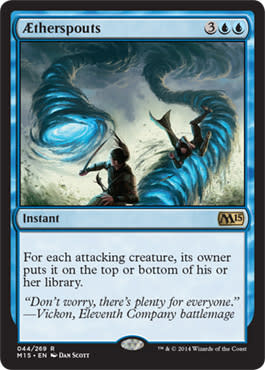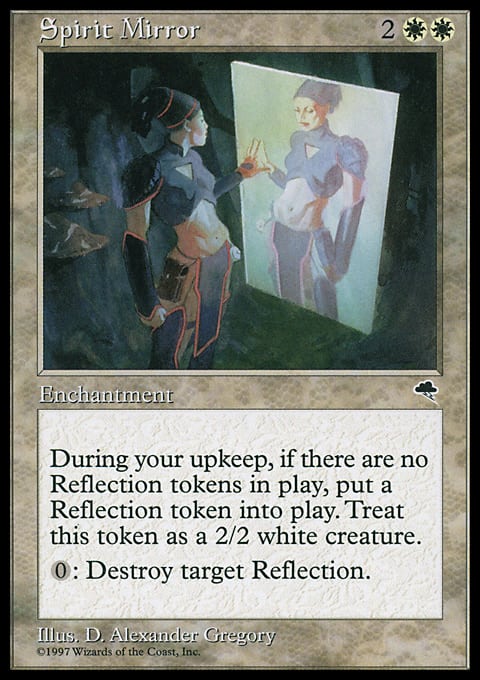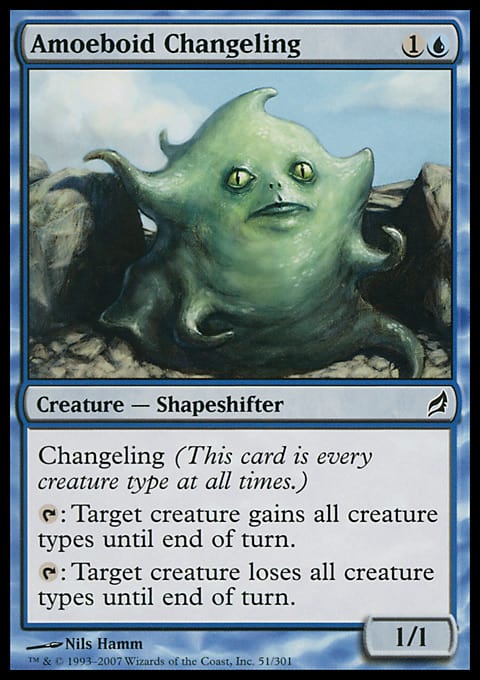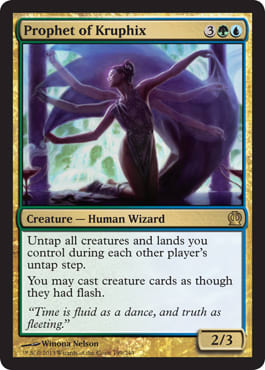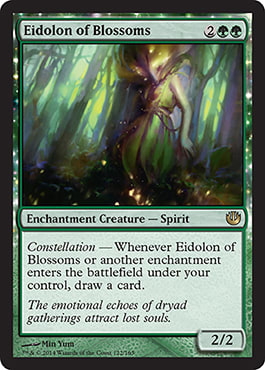In this experiment, we manipulate elements of our opponent’s creatures and force him or her into compromising positions.
Today’s list started with Aetherspouts. Kind of a combination of Aetherize and Rout, it can summarily smash a combat-focused opponent. Unfortunately, blindingly playing it into an unknown opponent can be dangerous, as Aetherspouts only affects attacking creatures, and the opponent may not be planning to attack or may not use creatures at all. With this deck, we’ll make sure our opponent has creatures just so we can Aetherspouts them.
Just Revolting
What’s the point of giving the opponent creatures just so we can Aetherspouts them? Well, if the creatures we’re “giving” are the player’s lands, Aetherspouts can put all of the player’s lands into his or her library, virtually securing our victory. From there, the player will have to decide whether to draw a bunch of lands to recreate a board state or put them on the bottom and hope playing from the top will be sufficient.
Fortunately, we should be able to have dealt with our opponent by then, as the card we’ll be using to transform our opponent’s lands into creatures will be Nature's Revolt, which also transforms our lands into creatures. Once our opponent has been hit by Aetherspouts, we’ll be free to swing in with an army of 2/2s.
Why Attack?
Of course, if our opponent has any idea what we’re up to, or just if he or she is playing slightly reserved, those enemy land creatures may not be entering the red zone. To force our opponent’s hand a bit, Bident of Thassa is around to remove the decision and force our opponent to walk into our Aetherspouts. I can imagine a scenario in which we have Nature's Revolt and Bident of Thassa and are able to hit our opponent with several lands to draw a bunch of cards, but that seems unlikely.
Gideon Jura can also force the opponent’s creatures to attack, and he’ll also play nice defensive duty while we set up. He can also end a game quickly on an otherwise-emptied board.
Finally, Siren's Call is a card that lets us pull off the trick as an instant-speed surprise. And apart from summoning-sick land creatures, Siren's Call will also punish the opponent for not attacking with his or her lands. Against Bident of Thassa and Gideon Jura, our opponent can just tap his or her land creatures for mana precombat in order to avoid the attacking requirement. But against a Siren's Call, the opponent will have all of his or her land creatures that didn’t attack destroyed.
Plan B
Building around Nature's Revolt reminded me of an old combo deck I had several years ago. I sometimes forget exactly what kinds of things I’ve written about since I started sharing weird brews almost every week. When I can’t quite remember, I run a Google search for my own name and the card I’m wondering about.
In this case, I was very surprised to find zero hits for my name alongside Spirit Mirror. This is an adorable little card with a relatively low power level, but it effectively creates an indestructible 2/2 for 4. At the beginning of your upkeep, if you don’t have a Reflection, a 2/2 walks out of the Mirror. If that one somehow leaves play or is destroyed, you’ll make another next turn. And if one becomes locked up by something like a Pacifism or a Crippling Blight, you can use the weird power to pay ![]() and destroy target Reflection—basically so you can remake a fresh Reflection on your subsequent upkeep.
and destroy target Reflection—basically so you can remake a fresh Reflection on your subsequent upkeep.
Incidentally, the ability “![]() : Destroy target Reflection” can be used in some more interesting ways. Notably, it can destroy an opposing Mistform Ultimus or Chameleon Colossus. How I like to use it, however, is with a card like Amoeboid Changeling, Unnatural Selection, or Standardize. When we change an opponent’s creature’s type to Reflection, we can use Spirit Mirror to pay
: Destroy target Reflection” can be used in some more interesting ways. Notably, it can destroy an opposing Mistform Ultimus or Chameleon Colossus. How I like to use it, however, is with a card like Amoeboid Changeling, Unnatural Selection, or Standardize. When we change an opponent’s creature’s type to Reflection, we can use Spirit Mirror to pay ![]() and destroy it.
and destroy it.
That combo is relatively potent, turning Amoeboid Changeling into Avatar of Woe and Unnatural Selection into a card that basically says, “![]() : Destroy target creature.” Standardize is even a step up from Plague Wind in that its effective text becomes, “Destroy any number of target creatures.”
: Destroy target creature.” Standardize is even a step up from Plague Wind in that its effective text becomes, “Destroy any number of target creatures.”
In my Bant-colored Spirit Mirror deck, I also played Nature's Revolt. With this setup, we can destroy almost all opposing permanents as we choose, so I figured that as long as I was playing Nature's Revolt and Bant colors, I may as well play Spirit Mirror and a couple copies of Standardize.
A Bit of Support
Here are a few cards to round out the deck.
Prophet of Kruphix – This Prophet is obviously super-powerful. While Seedborn Muse fulfills basically the same role, being able to play creatures as instants is a nice upside. (Though I’m not sure who thought Seedborn Muse needed more upside in the first place.) Our deck can be pretty mana-intensive, so being able to cast Nature's Revolt on our turn and then untap and have mana for Aetherspouts is pretty important.
Eidolon of Blossoms – With twelve enchantments already in the deck (Spirit Mirror, Nature's Revolt, and Bident of Thassa), Eidolon of Blossoms seems to be a great fit to expedite our card-draw.
Vine Trellis – For the last card to add to the deck, I wanted a low-cost defensive card, preferably one that would play nicely with Eidolon of Blossoms. I was hoping for an enchantment Wall, but neither Lucent Liminid nor Theros block were forthcoming with this option. However, Vine Trellis is a fine defender that provides us ramp to accelerate into a turn-three Eidolon. And with Prophet of Kruphix, we can both tap for mana and block.
The Bident and the Spouts ? Casual | Andrew Wilson
- Creatures (12)
- 4 Eidolon of Blossoms
- 4 Prophet of Kruphix
- 4 Vine Trellis
- Planeswalkers (4)
- 4 Gideon Jura
- Spells (20)
- 2 Siren's Call
- 2 Standardize
- 4 Aetherspouts
- 4 Nature's Revolt
- 4 Spirit Mirror
- 4 Bident of Thassa
- Lands (24)
- 3 Forest
- 3 Island
- 3 Plains
- 3 Terramorphic Expanse
- 4 Flooded Grove
- 4 Mystic Gate
- 4 Wooded Bastion
If you’ve wanted to completely wipe your opponent’s board with Aetherspouts, if you love attacking with lands, or if you just love mirrors, give this deck a try.
Andrew Wilson
fissionessence at hotmail dot com













